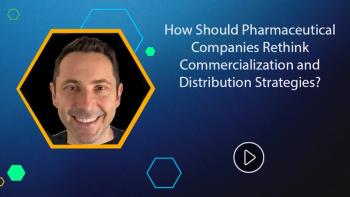
Don’t Waste A Crisis: How Paratek is Navigating the Business Implications of the COVID-19 Pandemic
A look at how pharmaceutical company, Paratek is navigating the launch of a new antibiotic during the COVID-19 pandemic.
When COVID-19 began to take hold as a public health crisis in the United States, it temporarily shuttered the home offices of many biotech and pharma companies and, more significantly, cut off their field teams’ physical access to physicians and hospitals. Companies had to find new ways to engage with healthcare providers or consider suspending field operations for an indefinite period.
For Paratek Pharmaceuticals Inc., a small biotech just a year into the launch of a new antibiotic, COVID-19 presented a singular conundrum: How could we educate infectious disease physicians – now on the front lines of the pandemic – about our product’s potential to help manage the crisis, without relying on the face-to-face opportunities that had traditionally supported commercialization of new treatments?
The situation could have dealt us a severe blow. Instead, we rose to the challenge. We saw the impact COVID-19 was having on the entire healthcare system and knew it was vitally important to provide healthcare professionals – especially infectious disease physicians – with the support, education and treatment options they needed to navigate the crisis. To meet this new reality head-on, we quickly adapted our business operations across sales and marketing, medical affairs and legal and compliance.
Paratek’s strategic plan for maintaining business continuity during the pandemic offers a useful case study for other companies that have products or services that may be important for battling a crisis, yet need to work around the very barriers that crisis imposes.
Paratek: Focused on playing a role in the broader solution
Paratek is a commercial-stage biopharmaceutical company that employs approximately 175 full-time workers and contractors, including a field-based footprint that covers most of the country. Our lead commercial product, NUZYRA® (omadacycline), is a modernized tetracycline antibiotic with a broad spectrum of activity against common Gram-positive, Gram-negative and atypical respiratory pathogens, including drug-resistant Streptococcus pneumoniae. In 2018, it became the first and only once-daily IV and oral antibiotic approved for treating community-acquired bacterial pneumonia (CABP) and acute bacterial skin and skin structure infections (ABSSIs) in nearly 20 years.
Like many life sciences companies, Paratek relies on in-person meetings for key business opportunities and operations. Sales representatives visit hospitals to educate physicians on the attributes of NUZYRA, market access teams engage with payers to discuss coverage and reimbursement issues and business teams regularly attend meetings and industry-related conferences.
Almost overnight, the response to COVID-19 temporarily halted “business as usual” across the life sciences industry. That response also erected barriers at perhaps the worst possible moment for the antibiotics sector, whose marketplace is already fragile and, in many ways, failing. Ninety-five percent of the sector’s innovation occurs in small, single-product companies. Before COVID-19, almost all of these companies were either exiting the business, struggling on the brink of financial collapse or had already gone bankrupt; COVID-19 threatened to push more of them into dire straits.
At the same time, COVID-19 highlighted the need for robust and diverse options to treat infectious pathogens. Antimicrobial resistance (AMR) has long been on the rise; multidrug-resistant (MDR) bacteria now infect more than 2 million Americans annually. Patients with COVID-19 combat not only the coronavirus; some also have concurrent bacterial pneumonia and secondary bacterial infections, many of which are caused by MDR pathogens.
Since the commercial launch of NUZYRA in February 2019, Paratek has invested significant resources into educating the infectious disease community on the role NUZYRA can play in combatting AMR. With COVID-19, we also recognized the critical role our product could play in managing the crisis, both as a potential treatment for secondary bacterial infections in COVID-19 patients and as a means reduce the CABP burden on hospitals: administration of IV antibiotics requires a hospital bed; the oral formulation of NUZYRA does not. CABP patients could therefore be treated with NUZYRA as outpatients, keeping hospital beds free for COVID-19 patients.
Within this context, Paratek implemented radical changes that touched every area of our operations and allowed us to continue to engage meaningfully with infectious disease physicians.
Embracing a new virtual reality in the right way
As soon as stay-at-home orders were issued, Paratek recognized the need to pivot to a fully virtual model that enabled our teams to engage frequently and efficiently to address issues and generate solutions. Like much of corporate America, this meant internal video meetings quickly became standard practice.
However, staying in contact with healthcare professionals in the infectious disease community, already overwhelmed by the pandemic, presented different challenges that required us to implement a multi-faceted solution overnight.
The core of this change consisted of new tools our nationwide sales force needed to hold virtual engagements with healthcare professionals. To achieve this, we leveraged our relationship with Veeva Systems to build a Customer Relationship Management System that was “fit to purpose” for us. Within 72 hours, we had a platform, business rules and training programs that allowed our field teams to conduct remote meetings and share materials in a secure manner with customers and healthcare providers (HCPs). Although nothing fully substitutes for face-to-face contact, our virtual engagements on the platform have more meaningful and valuable to all parties than mere phone conversations would have been.
To further support the individual outreach of field sales teams, we also implemented a “surround sound” of digital marketing tools and virtual offerings and deployed targeted email campaigns to highlight the attributes of NUZYRA and alert physicians to remote engagement opportunities.
For example, Paratek sales leadership coordinated two virtual speaker events, in which a nationally recognized key opinion leader (KOL) addressed a nationwide audience of HCPs. We held the events at 6.00 p.m. to accommodate the busy schedules of infectious disease physicians on the front line of the pandemic and, as appropriate, we reimbursed attendees for a meal. The events drew a total of approximately 200 attendees who were eager for peer-to-peer contact and we received enthusiastic feedback from them afterwards.
Cognizant that infectious disease clinicians have little spare time during the pandemic, our field teams have continued to engage virtually with them at their convenience – such as late in the evening on the clinician’s drive home – no matter where they were.
Similarly, our Medical Affairs organization also pivoted to virtual approaches to continue robust scientific exchange with KOLs. For example, we leveraged our social media presence to distribute the latest publications and guidelines relating to COVID-19 and the important role antibiotics must play in the current crisis and future pandemics. Our Field Medical team routinely engages with KOLs virtually and they have held virtual discussion sessions for KOLs to share clinical learnings and discuss relevant recently published articles. We have also transitioned to making virtual presentations to CMS and state Medicaid boards.
In addition, our Medical Affairs team has continued its support – now entirely virtual – of the conference-related work of our clinicians and KOLs. The team has helped our KOLs compose and submit conference abstracts virtually; and, after one conference was cancelled, the team and KOLs reformatted the content intended for a conference symposium into a virtual presentation, which will be recorded. Given the likelihood of other conference cancellations, we are now developing approaches to partner with our KOLs and social media platforms to “get the word out” about the research our clinicians would have presented at a conference that is called off.
A key factor that made these rapid, fundamental changes possible so quickly is an ongoing commitment to our core values – passionate, purposeful, collaborative, and resourceful – while always staying focused on “Winning the Right Way.”
During the crisis, we were testing and sometimes truncating normal processes to support rapid change. Our leadership recognized that, in the face of market headwinds and uncertainty, our workforce might have felt pressure to cut corners or circumvent controls.
However, our leadership team regularly reinforces the importance of compliant and ethical decision-making to solidify the principle that commercial success must never come at the expense of doing things the right way; the lines between what is appropriate and impermissible, even in times of crisis, are never blurred. Because of these consistently positive partnerships with Legal and Compliance, established well in advance of COVID-19, our workforce’s commitment to ethical and sustainable decision-making never wavered. Though physically apart, every one of our employees and contractors continued to make responsible business decisions.
Each of the new engagement platforms, virtual meetings or marketing initiatives implemented by Paratek was supported by thoughtful discussion and abundant planning to ensure that potential risk was appropriately managed while supporting vital business needs. We are still looking at new ideas and experimenting with them; no matter how these experiments work out, we want to learn from each one and institutionalize those learnings into a new “business as usual” model.
Evan Loh, M.D., CEO, Paratek Pharmaceuticals and Jonathan Light, Vice President, Associate General Counsel and Chief Compliance Officer, Paratek Pharmaceuticals
Newsletter
Lead with insight with the Pharmaceutical Executive newsletter, featuring strategic analysis, leadership trends, and market intelligence for biopharma decision-makers.




